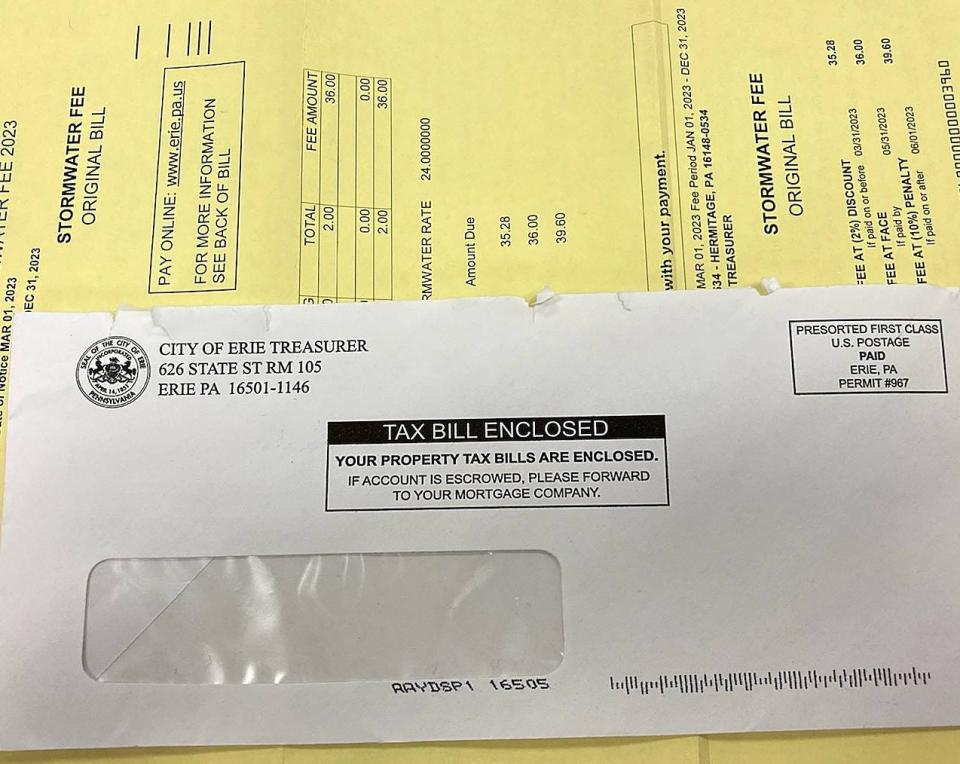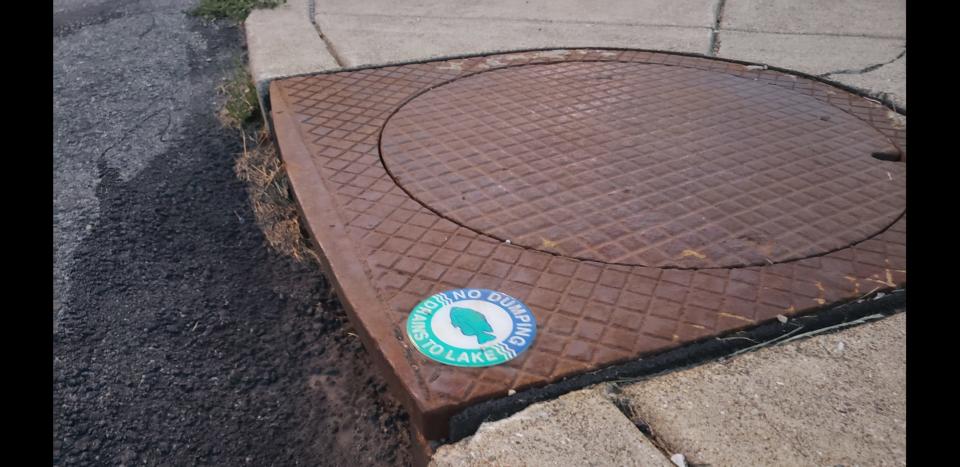Stormwater bills have hit city of Erie mailboxes. Here's a breakdown of the new fee
The bills are due.
Thousands of city of Erie property owners began receiving yearly stormwater fee bills this month, the culmination of Mayor Joe Schember’s years-long push for a new, annual citywide assessment earmarked for improvements to the city’s aging storm sewer system.
Schember has said the new fee will help cover the multimillion-dollar costs related to ongoing stormwater system maintenance and improvements and help the city meet state and federal environmental requirements for stormwater systems that regulate the runoff from rain and melting snow and ice.
Erie City Council:New stormwater fee approved

However, some local property owners have expressed concern that the new fee could hurt development within city limits and impose an additional financial burden on residents and existing businesses.
"We wanted to keep the fees as low as possible for residents," said Chris Millette, the city's communications director. "We created a stormwater utility fee that would be assessed on all property owners so we could spread the burden out over all property owners in the city."
Unchartered waters:Erie property owners, officials debate proposed new stormwater fee
City officials have said that millions of dollars in repairs and maintenance are needed to bolster sections of Erie's aged stormwater system, which includes more than 500 miles of pipe and lines. In many areas, tile-lined pipe and other crumbling infrastructure exists, and portions of the system date to the late 1800s.

Here is an Erie Times-News breakdown of the new stormwater fee and how it affects property owners.
What is the stormwater fee and how was it calculated?
Erie’s stormwater fee, approved by Erie City Council in October, is assessed on city property owners regardless of taxable status and is based on a billing unit of $24 per year for properties and a median square footage for properties of 2,136 feet.
The actual bill assessed to particular property depends on the exact square footage of that property and how much of the property is covered by impervious surfaces, such as parking lots, streets, walkways and patios, that allow little or no stormwater infiltration into the ground.
Based on the billing unit/square footage formula, single-family homes in the city pay a stormwater fee between $12 and $36 per year, depending on their actual square footage.
City homeowners, by and large, fall into three tiers:
Small tier includes about 9,600 homeowners with 500 to 1,200 square feet of impervious area, who would pay roughly $12 per year.
Medium includes about 9,900 homeowners with 1,201 to 1,550 square feet of impervious area, who would pay about $24 per year.
Large includes about 9,200 homeowners with more than 1,550 square feet of impervious area, who would pay roughly $36 per year.
However, larger property owners within city limits — which includes many businesses, nonprofits and public entities — pay higher yearly stormwater fees.
The fee for larger property owners is based on the number of billing units, with each $24 billing unit equal to 2,136 square feet of impervious area. So a large property owner with 200 billing units, for example, would pay a stormwater fee of $4,800 annually; 400 billing units would pay $9,600 a year; and 800 billing units would pay a stormwater fee of $19,200 annually.
The Schember administration’s push for a stormwater fee began in early 2021.
It was accelerated in the aftermath of a massive storm sewer failure on East Fifth Street in July 2021 — first reported by the Erie Times-News — that cost the city more than $1.2 million to repair and heavily damaged both a lumber business and a rental home.
Crumbling infrastructure:East Erie storm sewer failure will cost city at least $1.2 million

The Times-News also reported, in September 2021, that there are more than $10 million worth of storm sewer projects citywide that need to be addressed immediately to avoid the kind of massive failure the city saw on East Fifth Street.
Report:It will cost $10.5M to fix the crumbling sewer systems in these Erie neighborhoods
Schember has said the city is aware of other crumbling infrastructure underneath city streets, homes and buildings that needs repaired.
City Council previously signed off on using about $10.5 million of its $76 million allocation of federal American Rescue Plan funds for various stormwater repairs in a number of neighborhoods.
Many other Pennsylvania cities, including Meadville, Pittsburgh, Philadelphia, Allentown, Lancaster and Bethlehem, have put stormwater fees in place.
Wood Environmental & Infrastructure, a consulting firm with offices in Blue Bell, Pennsylvania, and other locations, recommended that the city of Erie put a stormwater fee in place.
Consultants with Philadelphia-based Public Financial Management Inc. also endorsed the city's implementation of a stormwater fee. PFM worked with city officials as a state-required financial consultant for the Early Intervention Program for financially struggling municipalities.
Due diligence:Advisory committee on tap as part of renewed push for citywide stormwater fee in Erie
Where does the money go, and how much revenue does the city plan to generate from the fee?
Stormwater fees are specifically earmarked for storm sewer repairs and maintenance. The city budgeted $1,683,041 in stormwater fee collections for 2023, according to city financial data.
How can property owners pay their bills?
Payments can be mailed to P.O. Box 1534, Hermitage, Pa. 16148-0534. Checks should be made payable to “city treasurer.”

Property owners can also pay bills online at www.cityof.erie.pa.us by clicking the “Make a Payment” button on the homepage. Visa, Mastercard, and Discover are accepted, with a convenience fee added to the total.
Property owners can also pay their stormwater fees in person at City Treasurer Cas Kwitowski’s office, which is in Room 105 at Erie City Hall, 626 State St. The office is open weekdays from 8:30 a.m. to 4:30 p.m.
Payments received before March 31 receive a 2% discount. Face-value payments can be made between April 1 and May 31, and stormwater fee payments received on or after June 1 will include a 10% penalty.
Additionally, the stormwater bills were sent to property owners in envelopes that indicate the mailings are related to property taxes, even though the stormwater fee is not a property tax.
Asked about that, city officials said in a statment: "For consistency, we sent them out in the property tax envelope to bring notice/attention to the stormwater fee bills inside. Later this year, the November reminder notices will be mailed out in the same property tax envelopes. They will incorporate all unpaid 2023 city, county and school tax bills along with the stormwater fee bills."
What happens if someone doesn’t pay the fee?
A lien could be placed on the property if the bill is not paid, according to city officials.
There are appeals/credit processes related to stormwater bills. How do they work?
Property owners who disagree with their stormwater bill total or believe a billing error was made must file an appeal with the city before May 15.
The city’s Department of Public Works will review appeals and respond to the property owner in writing within 30 days.
Property owners can also earn a fee credit of up to 45% for installing retention ponds, underground filtration systems, rain gardens or taking other measures to handle stormwater and reduce runoff.
More information, including appeals and fee credit applications that can be filled out and submitted online, is available at cityof.erie.pa.us/stormwater-management.
Contact Kevin Flowers at kflowers@timesnews.com. Follow him on Twitter at @ETNflowers.
This article originally appeared on Erie Times-News: What you should know about the city of Erie's new stormwater fee

